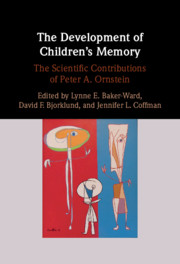Book contents
- The Development of Children’s Memory
- The Development of Children’s Memory
- Copyright page
- Dedication
- Contents
- Figures
- Tables
- Contributors
- Part I Backdrop
- Part II Children’s Memory Strategies
- Part III Children’s Event Memory
- Part IV Family Socialization of Memory
- Chapter 11 Developmental Pathways to Skilled Remembering
- Chapter 12 Making Memories in Museums
- Chapter 13 The Socialization of Gratitude
- Chapter 14 How Memory Develops in Conversational Contexts
- Part V Classroom Socialization of Memory
- Part VI Perspective
- References
- Index
Chapter 11 - Developmental Pathways to Skilled Remembering
Characterizing the Development of Children’s Event Memory within the Family Context
from Part IV - Family Socialization of Memory
Published online by Cambridge University Press: 28 May 2021
- The Development of Children’s Memory
- The Development of Children’s Memory
- Copyright page
- Dedication
- Contents
- Figures
- Tables
- Contributors
- Part I Backdrop
- Part II Children’s Memory Strategies
- Part III Children’s Event Memory
- Part IV Family Socialization of Memory
- Chapter 11 Developmental Pathways to Skilled Remembering
- Chapter 12 Making Memories in Museums
- Chapter 13 The Socialization of Gratitude
- Chapter 14 How Memory Develops in Conversational Contexts
- Part V Classroom Socialization of Memory
- Part VI Perspective
- References
- Index
Summary
This chapter examines the development of children’s verbal event memory skills across early childhood. A multi-method approach to the study of children’s developing memory skills and the ways in which these skills are socialized through conversations about the present and past are described. Particular emphasis is placed on characterizing the development of children’s verbal event memory skills across two primary tasks and over time, and most importantly, linking this development to detailed analyses of the social-communicative exchanges that children have with parents and other adults. The primary contributions of this work include the use of microanalytic assessments of parent–child conversations that underscore the unique importance of elaborative Wh-questions and evidence of the clear causal connections between elaborative language and children’s memory reports.
Keywords
- Type
- Chapter
- Information
- The Development of Children's MemoryThe Scientific Contributions of Peter A. Ornstein, pp. 167 - 185Publisher: Cambridge University PressPrint publication year: 2021

